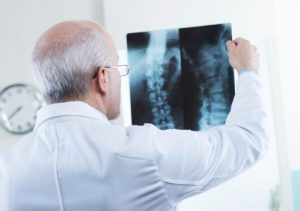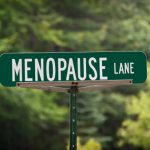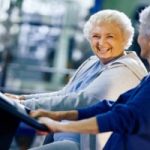 Bone loss, and more specifically osteoporosis, is often identified as a female health problem, but men are not immune to losing bone density. There are many factors which can contribute to bone loss, so practicing bone-boosting habits is essential, especially as you age.
Bone loss, and more specifically osteoporosis, is often identified as a female health problem, but men are not immune to losing bone density. There are many factors which can contribute to bone loss, so practicing bone-boosting habits is essential, especially as you age.
Bones are composed of minerals, the most predominant being calcium. The body goes through a process called resorption which means it breaks down old bone and creates newer, stronger ones. Unfortunately, as we age this becomes more difficult. The quicker old bone breaks down the more the need for new bone increases, but older adults simply do not create new bone as quickly as someone who is young. Bone loss can lead to osteopenia which can evolve into osteoporosis. Bone disease can increase fractures and breaks and can negatively impact a person’s life. Here are four factors which can contribute to bone loss, aside from aging, and what you can do to prevent bone loss.
4 factors which affect bone density:
Advertisement
Mental health
 You may not think your mental state impacts your bone health, but it does. Depression spans further than just your mood, it can take a drastic toll on your body as well – bones included. The National Institute of Mental Health reports that roughly 6.7 percent of American adults suffer from depression, and it has been studied that depression can lead to bone loss.
You may not think your mental state impacts your bone health, but it does. Depression spans further than just your mood, it can take a drastic toll on your body as well – bones included. The National Institute of Mental Health reports that roughly 6.7 percent of American adults suffer from depression, and it has been studied that depression can lead to bone loss.
One study discovered that among senior women, those with depression had lower bone density compared to women without depression. Additionally, younger women with depression who had yet to experience menopause had less bone density compared to women in the same group without depression. Even in men this connection can still be seen. Older men dealing with depression also have lower bone density, so men with osteoporosis should then also be checked for depression.
The link may be in part due to the hormones that are released in those with depression, which can break down bones.
If you suffer from depression, it may be wise to begin treatment to protect your bone health.
Hormones
 Particularly in women, estrogen plays a large role in bone density. When women are young (between 20 and 30) estrogen works to moderate bone growth. Bones are constantly being remodeled and estrogen is kept level through menstruation.
Particularly in women, estrogen plays a large role in bone density. When women are young (between 20 and 30) estrogen works to moderate bone growth. Bones are constantly being remodeled and estrogen is kept level through menstruation.
When women begin menopause estrogen begins to drop, which can contribute to about 20 percent loss in bone density. Although doctors may put women on estrogen supplements, there is not enough concrete evidence to support this as a viable solution.
For good measure it is important to consume a calcium-rich diet and exercise in order to keep bones strong.
Diet
 We all know calcium is the key to healthy bones, as it is the major mineral found within bones; however, with a growing population developing a lactose or dairy intolerance, many of us are not receiving adequate amounts of calcium.
We all know calcium is the key to healthy bones, as it is the major mineral found within bones; however, with a growing population developing a lactose or dairy intolerance, many of us are not receiving adequate amounts of calcium.
If you are over the age of 50 the recommended daily intake of calcium is 1,200 milligrams. Although milk will give you the highest concentration of calcium, there are other options out there for you.
Dark leafy greens, for one, are a good source of calcium. Additionally, fish like sardines can also boost your calcium. Eating calcium-rich foods is necessary for strong bones, but knowing what to avoid is important, too.
Foods high in salt, alcohol and caffeinated beverages can strip your bone density, so even if you’re consuming milk and leafy greens, you could be counteracting their benefits through salt, alcohol and caffeine.
Physical activity
 A lack of physical activity can set you up for weak bones. It may seem like a contradiction to add stress to increase strength, but that is exactly how exercise improves bones. When stress is added to bones it forces them to build new cells to make them stronger, thus building up bone density.
A lack of physical activity can set you up for weak bones. It may seem like a contradiction to add stress to increase strength, but that is exactly how exercise improves bones. When stress is added to bones it forces them to build new cells to make them stronger, thus building up bone density.
The best types of exercise to improve bone strength are weight-bearing exercises, resistance training and balance exercises. To choose the right activity for you it’s important to be aware of your own abilities. It may be good practice to begin with balance exercises like yoga or tai chi and work your way to weight-bearing exercises. Balance exercises are important for seniors as improved balance can reduce the risk of falls which can lead to fractures.
If, up until now, you have remained quite sedentary you’re only harming your bones more.
These are just four main factors which play a role in your bone density. No matter your age it’s not too late to begin adapting to some of these changes or begin treating ailments like mental illness and estrogen loss.
Related Reading:
Is this bone disease affecting your hearing?
According to the International Osteoporosis Foundation one in three women over the age of 50 will develop osteoporosis – a disease categorized by bones becoming weak and brittle. While commonly referred to as a woman’s disease, men are not immune. Continue reading…
Advertisement
7 quick tips to improve bone density
Stand tall and proud and consider this: In many ways, our bones define who we are. They give us our size and shape, they also keep us moving and upright. We wouldn’t get very far without them – but when was the last time we did our bones a solid favor and investigated our bone mineral density normal range or looked into foods for improving bone density? Continue reading…
Sources:
http://www.health.com/health/article/0,,20840533,00.html
http://www.emedicinehealth.com/what_is_bone_loss/article_em.htm
http://www.nimh.nih.gov/health/publications/depression-and-osteoporosis/index.shtml
